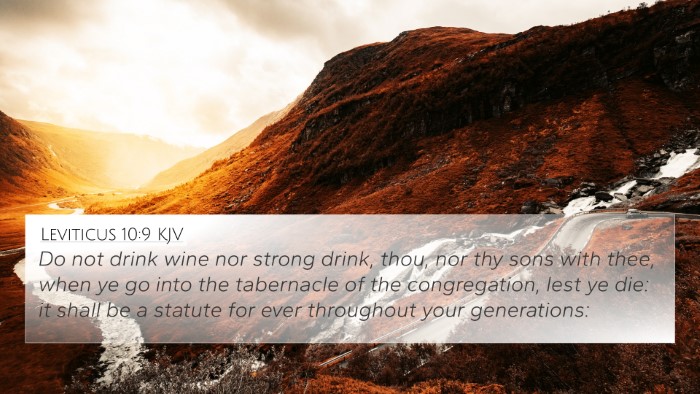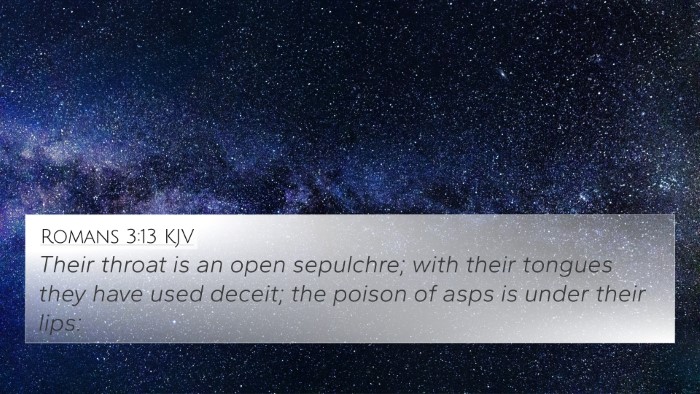Old Testament
Genesis Exodus Leviticus Numbers Deuteronomy Joshua Judges Ruth 1 Samuel 2 Samuel 1 Kings 2 Kings 1 Chronicles 2 Chronicles Ezra Nehemiah Esther Job Psalms Proverbs Ecclesiastes Song of Solomon Isaiah Jeremiah Lamentations Ezekiel Daniel Hosea Joel Amos Obadiah Jonah Micah Nahum Habakkuk Zephaniah Haggai Zechariah Malachi1 Timothy 3:8 Similar Verses
1 Timothy 3:8 Cross References
Likewise must the deacons be grave, not doubletongued, not given to much wine, not greedy of filthy lucre;
Uncover the Rich Themes and Topics of This Bible Verse
Listed below are the Bible themes associated with 1 Timothy 3:8. We invite you to explore each theme to gain deeper insights into the Scriptures.
1 Timothy 3:8 Cross Reference Verses
This section features a detailed cross-reference designed to enrich your understanding of the Scriptures. Below, you will find carefully selected verses that echo the themes and teachings related to 1 Timothy 3:8 KJV. Click on any image to explore detailed analyses of related Bible verses and uncover deeper theological insights.

Philippians 1:1 (KJV) »
Paul and Timotheus, the servants of Jesus Christ, to all the saints in Christ Jesus which are at Philippi, with the bishops and deacons:

Acts 6:3 (KJV) »
Wherefore, brethren, look ye out among you seven men of honest report, full of the Holy Ghost and wisdom, whom we may appoint over this business.

Titus 2:3 (KJV) »
The aged women likewise, that they be in behaviour as becometh holiness, not false accusers, not given to much wine, teachers of good things;

1 Timothy 3:3 (KJV) »
Not given to wine, no striker, not greedy of filthy lucre; but patient, not a brawler, not covetous;

1 Timothy 5:23 (KJV) »
Drink no longer water, but use a little wine for thy stomach's sake and thine often infirmities.

Leviticus 10:9 (KJV) »
Do not drink wine nor strong drink, thou, nor thy sons with thee, when ye go into the tabernacle of the congregation, lest ye die: it shall be a statute for ever throughout your generations:

James 3:10 (KJV) »
Out of the same mouth proceedeth blessing and cursing. My brethren, these things ought not so to be.

Psalms 12:2 (KJV) »
They speak vanity every one with his neighbour: with flattering lips and with a double heart do they speak.

Titus 1:7 (KJV) »
For a bishop must be blameless, as the steward of God; not selfwilled, not soon angry, not given to wine, no striker, not given to filthy lucre;

1 Timothy 3:12 (KJV) »
Let the deacons be the husbands of one wife, ruling their children and their own houses well.

Psalms 5:9 (KJV) »
For there is no faithfulness in their mouth; their inward part is very wickedness; their throat is an open sepulchre; they flatter with their tongue.

Romans 3:13 (KJV) »
Their throat is an open sepulchre; with their tongues they have used deceit; the poison of asps is under their lips:

1 Peter 5:2 (KJV) »
Feed the flock of God which is among you, taking the oversight thereof, not by constraint, but willingly; not for filthy lucre, but of a ready mind;
1 Timothy 3:8 Verse Analysis and Similar Verses
Understanding 1 Timothy 3:8
Verse: 1 Timothy 3:8 - "Deacons likewise must be dignified, not double-tongued, not addicted to much wine, not greedy for dishonest gain."
This verse provides specific qualifications for deacons in the church, emphasizing the moral and ethical integrity required for those serving in leadership roles.
Summary of Insights
In this passage, the Apostle Paul delineates the characteristics that deacons should exemplify, affirming that they hold a significant responsibility within the church community. Below is a summary of interpretations based on public domain commentaries:
- Matthew Henry: Henry highlights the necessity of dignity and integrity among deacons, arguing that their conduct must inspire respect and trust within the congregation. He remarks that deacons are to be exemplary in character, representing the teachings of Christ in their charge.
- Albert Barnes: Barnes elaborates on the phrase "not double-tongued," explaining that deacons must be truthful and reliable in their speech. He warns against the detrimental effects of hypocrisy and deception, stressing that deacons are to provide a model of honesty and fervor for the church.
- Adam Clarke: Clarke emphasizes the dangers of being "addicted to much wine," suggesting that deacons should maintain a spirit of temperance and moderation in all things. He points out that excessive drinking can lead to poor judgment and moral failings, which must be avoided by those in positions of influence.
Bible Verse Cross-References
This verse connects with several other scriptures which emphasize similar qualities for church leaders and members, thereby facilitating a deeper understanding of Biblical leadership. Here are some relevant cross-references:
- 1 Timothy 3:1-7: The previous verses outline the qualifications for overseers, which parallel those of deacons.
- Titus 1:5-9: Similar qualifications for elders and deacons can be found, reinforcing the importance of integrity and sound teaching.
- Acts 6:1-6: This passage describes the selection of the first deacons, underscoring their need for spiritual maturity and reputation.
- Philippians 1:1: Here, Paul addresses the saints in Philippi along with their deacons, reflecting the structure of church leadership.
- 1 Peter 5:2-3: Peter offers counsel on the manner of pastoral leadership, emphasizing the shepherding role and integrity essential for elders.
- Luke 16:10: This verse discusses faithfulness in small matters, paralleling the theme of integrity in leadership roles.
- Proverbs 11:3: It highlights the importance of integrity, suggesting that honesty provides a strong foundation for leadership.
- Romans 12:8: Discusses the use of spiritual gifts, urging those with the gift of service to embody the characteristics Paul describes for deacons.
Thematic Bible Verse Connections
The themes present in 1 Timothy 3:8 also resonate through various Biblical writings, allowing for thematic Bible verse connections that enrich our understanding of church leadership:
- Integrity: The qualities of honesty and trustworthiness appear throughout the Bible, evident in Proverbs and the teachings of Jesus (e.g., Matthew 5:37).
- Servanthood: The concept of servanthood as a qualification mirrors the teachings of Christ in John 12:26 and Mark 10:43-45.
- Moral Conduct: Scriptures emphasizing moral integrity include Ephesians 4:1-3, where Paul urges believers to walk in a manner worthy of their calling.
Cross-Referencing Biblical Texts
Using tools for Bible cross-referencing can enhance your study of 1 Timothy 3:8. These tools help trace thematic connections and identify corresponding verses based on similar concepts or character traits:
- Bible Concordance: Utilizing a concordance can assist in locating verses related to integrity and leadership.
- Bible Cross-Reference Guide: These guides often categorize verses based on themes, aiding in comparative Bible verse analysis.
- Bible Reference Resources: Comprehensive reference materials allow for an extensive cross-referencing Bible study.
How to Utilize Bible Cross-References
When studying passages like 1 Timothy 3:8, consider these methods for effective Bible cross-referencing:
- Identifying Key Themes: Focus on the major themes such as integrity, servanthood, and moral character.
- Studying Parallel Passages: Examine other scriptures that discuss church leadership, such as those mentioned in the cross-references section.
- Contextual Analysis: Understand the context surrounding these verses, facilitating a greater comprehension of their implications for church governance.
- Comparing Different Translations: Different Bible versions may provide varied insights into the nuances of the text.
Conclusion
1 Timothy 3:8 serves as a foundational text regarding the qualifications and responsibilities of deacons. By employing various Bible study methods, including cross-referencing, readers can gain a fuller grasp of the expectations set forth in Scripture. This framework not only enriches our understanding of specific verses but also allows for deeper connections across the biblical narrative.





